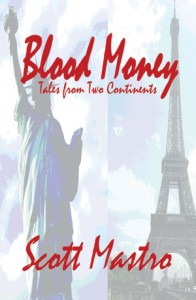
Author Scott Mastro offers short stories spanning the globe with Blood Money: Tales from Two Continents. – Photo by Paul Pacak
By Sanjeev Selvarajah
Somerville author Scott Mastro divides the short stories in his Blood Money: Tales from Two Continents chiefly between North America and Europe. This literary work came out earlier this year. The stories in the collection range from Hawaii, and the American South to France, Italy, and London. The characters of Mastro’s work are like the average reader, outsiders, who are impelled to speak the way they do and act as a result of their localization; the readers look to the Southern, the Hawaiian or the Parisian for a portrait of humanity one has only heard about.
Mastro composes a rich tapestry with his narratives and use of dialogue, or occasionally the conscious absence of communication. Two young individuals, a Muslim and a Korean engage in an innocent romance with which the collection establishes the cosmopolitan fixtures of each chapter. During this first instance, which is Paris, very little except for physical intimacy is said and shared between the two guests. The allusion to the ancient storytelling tradition that traversed the old Silk Road, from the Middle East to Asia, centers itself around the two initial characters before the other short stories follow.
“At the river, they turned along a foot path that hugged the bank and stopped in the middle of a bridge to watch the water beneath them, suspended together in what Time could not touch.” The publishing house that managed to grab a hold of Scott Mastro first was Hawaii’s Savant Books and Publications. Hawaii is featured in the series, which includes the island in a tale of a Hawaiian man and his dog on a fishing trip. Like any good writer, Mastro slipped on the bait, dropped the line, and waited-it-out, until his patience paid off. “We like to say that Savant is all about sharing with readers the finest in enduring literature – stories with a twist – that, in their reading, enlarge our individual points of view of this incredible spinning ball, flying though space, that we inhabit and share together. In all three, Blood Money is a wonderful “fit” for Savant, and we’re proud to have created an opportunity for the world to meet Mr. Scott Mastro,” says Daniel S. Janik, publisher.
Each local pays off. The wealth of tone created by the dialogue or silence is immense. “Another point that attracted us to his manuscript, was his interest in linguistics, especially in writing as if the story were being told in “local slang” of the place and era,” says Mr. Janik.
The reader discovers that a character like Professor Skoczek possesses an inner dialogue with his cat Szprotka, who, despite the Professor’s absent-minded affection, prefers its own company and devices. Rarely are animal friends seen as objects of respective journeys, yet one expects them to greet each at the door after a hard day’s work. The Professor attempts to enlist the aid of his little Polish village, like some pet-friendly militia made up of grandmother-shopkeepers and their granddaughters, epitomized representing their local scene with lines like, “We Hate History!” coming from the beautiful triplets; it’s almost as if their refusal to pander to all of the Professor’s whims parallels the Pink Floyd song, “We Don’t Need No Education”; double–negatives aside they “don’t need no thought control” either, but they will help the Professor find his lost companion. The Professor pleased as punch for the assistance in finding his pussycat, is on a high and tangent that surges past the beauty and the singularity of the three girls.
 The serene is captured here in village life; in contrast, the claustrophobia of a major metropolitan life such as the Londoner Mr. Emm’s is detailed in absurdist representations of the British Invasion of rock and roll, and even sketch comedy. With the mention of Maxwell’s Silver Hammer, John and Paul’s cartoon lyricism, and a sense of knighthood is transferred to the key character, who not only lives out the dreams of the Beatles, but also of other English nationals like Monty Python, and their clash of props and anachronisms. The charm of this short story is worth the price of the entire text for its creative driving force which uses popular culture and its hero as a fulcrum.
The serene is captured here in village life; in contrast, the claustrophobia of a major metropolitan life such as the Londoner Mr. Emm’s is detailed in absurdist representations of the British Invasion of rock and roll, and even sketch comedy. With the mention of Maxwell’s Silver Hammer, John and Paul’s cartoon lyricism, and a sense of knighthood is transferred to the key character, who not only lives out the dreams of the Beatles, but also of other English nationals like Monty Python, and their clash of props and anachronisms. The charm of this short story is worth the price of the entire text for its creative driving force which uses popular culture and its hero as a fulcrum.
“Lost in the horrific image of his beloved Zoonie’s Oxford education morphing into a two-year-associate-business-college-dental-assistant certificate. Mr. Emm didn’t answer picturing his daughter with a six-year-old’s teeth clenched to her tender hand”.
Like a silent prayer, the absurd middle-aged man, Mr. Emm wishes his daughter can hopefully assist in the pain and punishment of a bad set of teeth. It’s the touch of humanity, and other character traits that both isolate and propel these characters; how can they maintain their trajectories, yet they must, lest Mr. Mastro cap his pen. In addition to Blood Money which is already out, director Arno Kuhlein is making Scott Mastro’s play Moon over Mangroves into a film, as of right now in pre-production.















Reader Comments